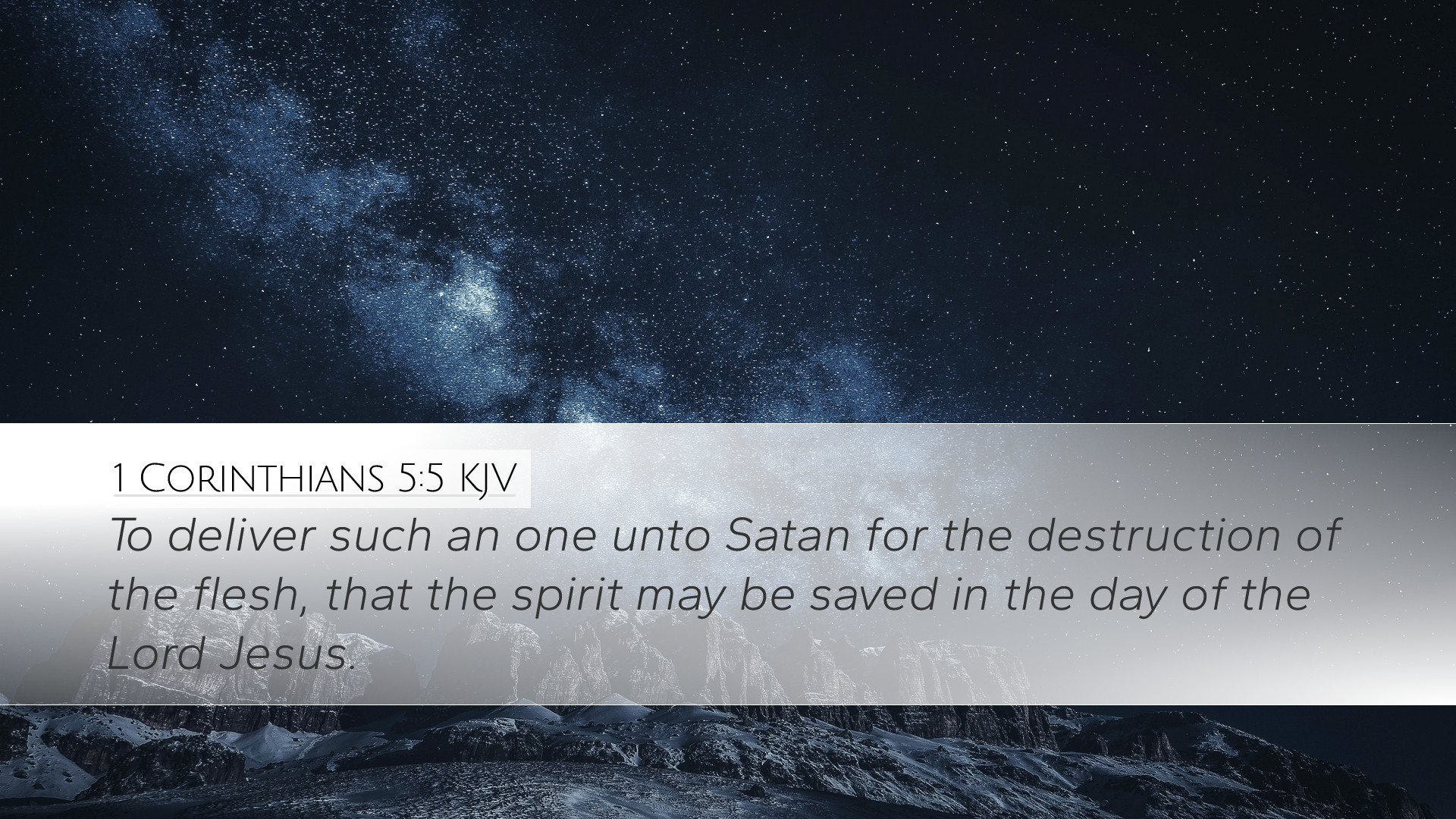Old Testament
Genesis Exodus Leviticus Numbers Deuteronomy Joshua Judges Ruth 1 Samuel 2 Samuel 1 Kings 2 Kings 1 Chronicles 2 Chronicles Ezra Nehemiah Esther Job Psalms Proverbs Ecclesiastes Song of Solomon Isaiah Jeremiah Lamentations Ezekiel Daniel Hosea Joel Amos Obadiah Jonah Micah Nahum Habakkuk Zephaniah Haggai Zechariah Malachi1 Corinthians 5:5
1 Corinthians 5:5 KJV
To deliver such an one unto Satan for the destruction of the flesh, that the spirit may be saved in the day of the Lord Jesus.
1 Corinthians 5:5 Bible Commentary
Commentary on 1 Corinthians 5:5
1 Corinthians 5:5 states:
"To deliver such a one unto Satan for the destruction of the flesh, that the spirit may be saved in the day of the Lord Jesus."
Introduction
This verse occupies a critical position within Paul’s epistle to the Corinthians, highlighting issues of morality within the church community and reflecting the apostolic stance on church discipline. Commentary from various public domain sources provides rich insights into the theological, practical, and ecclesiastical implications of this text.
Contextual Background
Paul's first letter to the Corinthians addresses a variety of issues affecting the church at Corinth, including divisions, immorality, and questions about spiritual gifts. Chapter 5 specifically deals with a case of sexual immorality, urging the church to take serious action against the unrepentant sinner.
Analysis of Key Phrases
- “Deliver such a one unto Satan”:
Matthew Henry interprets this phrase as a call to expel the unrepentant sinner from the church, signifying surrendering him to the realm of the world, where Satan has influence. This is not a condemnation but an attempt to lead the person to genuine repentance.
- “For the destruction of the flesh”:
Albert Barnes sees this as referring to the physical consequences of sin which serve to bring the individual to a humble realization of their condition. The destruction of the flesh implies suffering or hardships that the sinner may face outside the community of faith.
- “That the spirit may be saved”:
Adam Clarke emphasizes that the ultimate goal of this disciplinary action is restoration, not punishment. The hope is that through the trials of this separation, the individual might come to true repentance and salvation.
Theological Implications
This passage underscores the disciplinary role of the church in matters of moral failure. It raises significant theological questions about the nature of sin, the consequences of unrepented sin, and the hope for redemption.
Application for the Church
Pastors and church leaders are often confronted with similar issues of immorality within their congregations. The teaching here urges decisive action in love, aiming ultimately for restoration rather than condemnation. It reflects the need for a balance between grace and truth in ministering to individuals in sin.
The Role of Church Discipline
Church discipline is a critical aspect of maintaining the purity of the church. Both Matthew Henry and Albert Barnes express the view that such measures should be taken compassionately, with the goal of restoration. The church must not disregard sin but must approach it with serious concern for the spiritual welfare of the individual involved and the community as a whole.
Conclusion
1 Corinthians 5:5 presents a profound example of the necessity for church discipline rooted in love and grace. For pastors, students, theologians, and Bible scholars, this verse serves as a reminder of the balance required in upholding both the holiness of God and the hope of restoration for those caught in sin.


